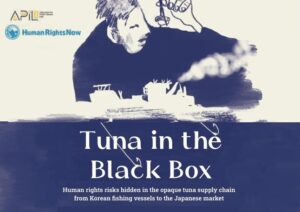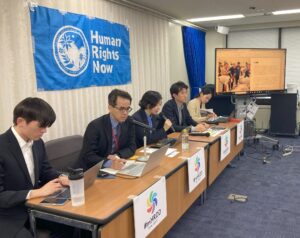The Tokyo-based NGO Human Rights Now (HRN) and the South Korea-based NGO Advocates for Public Interest Law (APIL) have released a joint report on labor rights violations on South Korean deep-sea fishing vessels catching tuna which is being sent to the Japanese market, “Tuna in the Black Box: Human rights risks hidden in the opaque tuna supply chain from Korean fishing vessels to the Japanese market”.
The full report is available from the following links in three languages.
- English version
- Japanese version (additional materials from companies in Japanese)
- Korean version
In drafting the report, we conducted a survey on human rights risks hidden in the tuna supply chain. South Korea’s deep-sea fishing fleet, which is the fourth largest in the world, mainly supplies yellowfin, bigeye, and bluefin tuna to the global market as sashimi tuna, with Japan being the largest importer of tuna caught by South Korean longline fishing vessels. However, the supply chain in which tuna caught by Korean longline fishing vessels reaches the Japanese market is extremely complex and lacks transparency. Because tuna longline fishing vessels stay at sea for longer periods of time without port calls than other deep-sea fishing vessels, the crew are exposed to higher human rights risks such as forced labor and human trafficking. In particular, immigrant workers, who make up the majority of the crew members, are forced to work long hours exceeding 12 hours, work at a low wage that is one-tenth that of Korean fishermen, and suffer from unpaid wages and illegal deductions. They are also vulnerable to verbal and physical abuse.
An analysis of the human rights due diligence policies and their implementation status for major companies in Japan involved in the import and distribution of tuna revealed that none of the companies have disclosed their supply chains. Although some companies have specific human rights due diligence policies and tuna-related procurement guidelines, information about how these policies are actually implemented has not been made public. Furthermore, the current human rights due diligence policies and implementation systems of Japanese companies are insufficient to identify and address the high-risk human rights risks of human trafficking and forced labor on deep-sea fishing vessels in their supply chain. Governments, international organizations, and companies must play their respective roles to increase transparency in such cross-border supply chains and eliminate human rights violations and illegal fishing.





